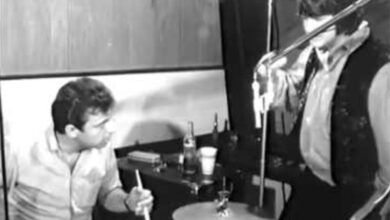Sgt. Barry Sadler’s “Ballad Of The Green Berets” Offers A Stirring And Patriotic Tribute
In 1966, Staff Sergeant Barry Sadler made a significant impact on American music and culture with the release of “The Ballad of the Green Berets.” As a patriotic anthem during a tumultuous time in U.S. history, the song resonated deeply with a nation grappling with the realities of the Vietnam War. The lyrics pay tribute to the courage and sacrifice of the U.S. Army Special Forces, known as the Green Berets, framing their service in a glorified light that appealed to both soldiers and civilians. Sadler’s personal experiences as a medic in Vietnam, where he was injured in combat, provided him with a profound understanding of the sacrifices made by those in uniform, making his message even more poignant.
Upon its release, “The Ballad of the Green Berets” soared to the top of the Billboard Hot 100, where it held the No. 1 spot for five consecutive weeks, a testimony to its popularity during that era. The song was among the top-selling singles of 1966, standing alongside chart-toppers from iconic bands such as The Beatles and The Rolling Stones. This unexpected success transformed Sadler’s life, propelling him into the limelight as a recording artist and cultural figure. He was featured on pivotal television programs of the time, including The Ed Sullivan Show, where he could share his song and its powerful message with a broader audience.
Despite the initial success of “The Ballad of the Green Berets,” Sadler’s musical career did not maintain the same momentum. He released several subsequent recordings, but none captured the public’s attention like his first hit. This setback pushed Sadler to explore different avenues to sustain his livelihood. He ventured into acting and attempted to establish a presence in the business world, though many of these endeavors did not yield the success he had hoped. His artistic pursuits reflected a struggle to adapt to life beyond the military and the pressures of newfound fame.
In the late 1970s, Sadler turned his creative focus toward writing, producing a series of pulp novels centered on the character of Casca Rufio Longinus, a Roman soldier condemned to wander the Earth until the Second Coming. Though not widely celebrated in literary circles, the Casca series garnered a loyal following and contributed to Sadler’s identity as an author. The unique storyline, which combined elements of history, religion, and adventure, allowed Sadler to explore themes similar to those found in his music—heroism, sacrifice, and the human condition.
However, Sadler’s personal life took a tragic turn during this time. In 1978, he was involved in a disturbing incident that resulted in the death of country music songwriter Lee Emerson Bellamy. Found guilty of voluntary manslaughter, Sadler faced significant legal repercussions that dramatically altered the course of his life. After serving a reduced sentence, he moved to Guatemala during the 1980s, seeking a fresh start. In Guatemala, he continued to write, but also became involved in providing medical assistance to local civilians caught in the ravages of a civil war, blending his medical training with his creative passions.
The narrative of Sadler’s life took another tragic twist when, in 1988, he was shot in the head during a robbery attempt in Guatemala. This violent act led to severe medical complications, leaving him in a coma and ultimately resulting in quadriplegia. His return to the United States marked a somber turning point, as he struggled with the physical and emotional ramifications of his injuries. The once-vibrant figure who had captured the spirit of a generation was left fighting for his life.
Barry Sadler passed away in 1989 due to complications related to his injuries, but his legacy endures. “The Ballad of the Green Berets” continues to be played at military events and memorials, serving as a somber reminder of the sacrifices made by servicemen and women. The song is often regarded as a cultural artifact of the Vietnam era, embodying both patriotism and the complex emotions surrounding the conflict. It serves as a vehicle for reflection on the costs of war and the manner in which soldiers’ stories are told.
Despite the controversies that overshadowed his later years, Sadler’s contribution to music and literature remains significant. His ability to connect with audiences through poignant storytelling reflects a deep understanding of the human experience. As an artist, he embodied the struggles and triumphs of those who served in the military, serving as a voice for both the glory and the tragedy often associated with war. The complexity of his life and career invites discussion about fame, responsibility, and the intricacies of living authentically amid external pressures.
Moreover, “The Ballad of the Green Berets” endures not only as a song but as a representation of a time when the American public was grappling with its values, identity, and the reality of their soldiers’ sacrifices. Sadler’s journey, both as a soldier and as an artist, prompts conversations on the legacy of veterans and the ways in which society honors and remembers them. Through his song, he fostered understanding and admiration for the bravery of soldiers, imbuing his lyrical narrative with a sense of pride that continues to resonate today.
Thus, the life and work of Barry Sadler are a testament to the dualities of heroism and personal struggle, especially in the context of the Vietnam War and its aftermath. The juxtaposition of his patriotic celebration of the Green Berets against the complex realities of his life provides a compelling narrative that endures in American culture. Through his music and writings, he contributed to the understanding of the military experience, creating a lasting impact that invites reflection on the cost of service and the stories of those who serve.





